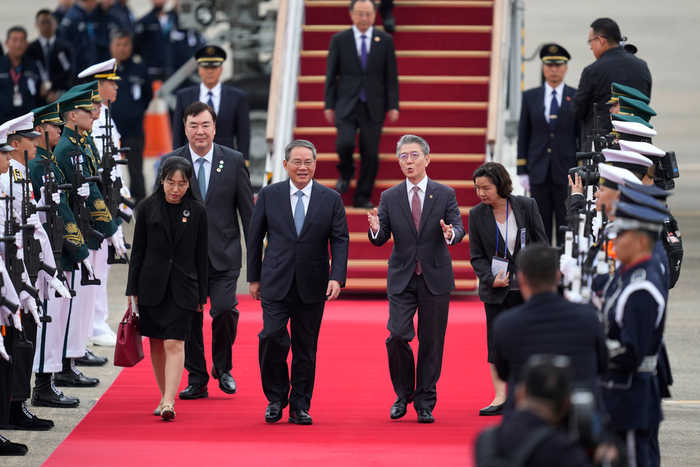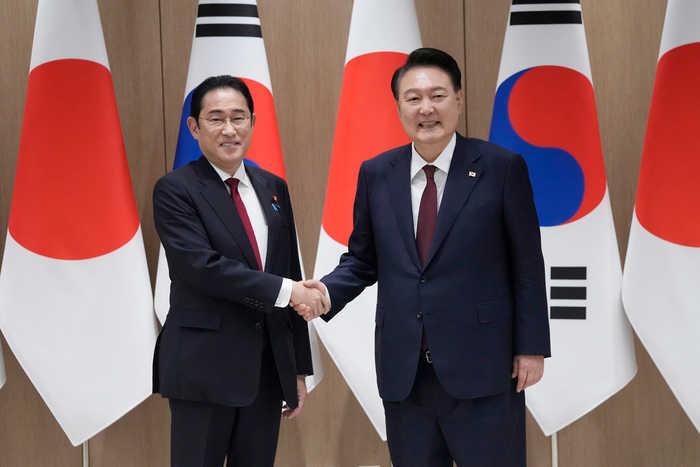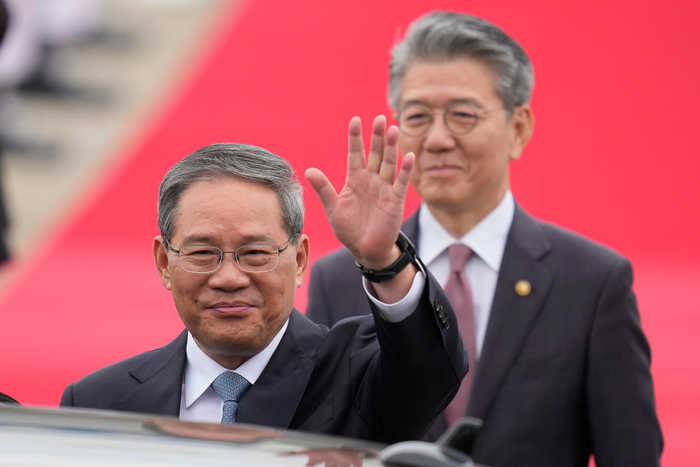Published 17:46 IST, May 26th 2024
Chinese, Japanese Leaders Arrive in Seoul for First Trilateral Meeting Since 2019
No significant announcement is expected from the meeting, with the agenda likely to focus on economic cooperation between the three major Asian economies.
- World News
- 4 min read
Seoul: Leaders of China and Japan arrived in Seoul to meet separately with South Korea’s president on Sunday, a day before they gather for their first trilateral meeting in more than four years. No major announcement is expected from Monday’s trilateral South Korea-China-Japan meeting. But just resuming their highest-level, three-way talks is a good sign and suggests the three Asian neighbors are intent on improving their relations.
A trilateral leaders’ meeting was supposed to take place annually following their inaugural gathering in 2008. But the meeting has stalled since the last one in December 2019 in Chengdu, China because of the COVID-19 pandemic and complex ties among the three countries.

After their arrivals in Seoul on Sunday, Chinese Premier Li Qiang and Japanese Prime Minister Fumio Kishida are to hold bilateral talks with South Korean President Yoon Suk Yeol to discuss ways to promote cooperation and other issues, according to South Korean officials. Li and Kishida are expected to meet bilaterally as well.
When Yoon, Li and Kishida meet for a trilateral session on Monday, they'll discuss cooperation in six specific areas — people-to-people exchanges, climate change, trade, health issues, technology and disaster responses, according to South Korea's presidential office.
Sensitive topics like North Korea's nuclear programme, China's claim over self-governed Taiwan and territorial disputes in the South China Sea are not among the official agenda items.
But some experts say North Korea's nuclear programme — which poses a major security threat to South Korea and Japan — will likely be discussed among the three leaders though it's unclear whether and how much they would publicize the contents of their discussions.
The three neighbors are important trading partners to one another, and their cooperation is key to promoting regional peace and prosperity. They together make up about 25 per cent of global gross domestic product.

But the three countries have been repeatedly embroiled in bitter disputes over a range of historical and diplomatic issues originating from Japan’s wartime atrocities. China's rise and a U.S. push reinforce its Asian alliances have also significantly impacted their three-way ties in recent years.
South Korea and Japan are both vibrant democracies and key US military allies in the region, but their ties in past years suffered a huge setback over the issue of Korean forced laborers during the 1910-45 Japanese colonial period.
Bilateral ties have warmed dramatically since last year, when Yoon took a major step toward moving beyond historical grievances to cope with shared challenges like North Korean nuclear threats, the intensifying Chinese-US rivalry and supply chain vulnerabilities.
Since 2022, North Korea has been engaged in an unprecedentedly provocative run of weapons tests to build powerful nuclear missiles capable of hitting key sites in the mainland US, South Korea and Japan.
In response, South Korea, Japan and the US have expanded their trilateral security partnership, but that has drawn rebukes from China and North Korea.
South Korea, Japan and the US want China — North Korea’s major ally and economic pipeline — to use its leverage to persuade the North to abandon its nuclear ambitions. But China is believed to have clandestinely supported the impoverished North.

Experts say South Korea, China and Japan now share a need to improve ties. South Korea and Japan want better ties with China because it is their biggest trading partner. China, for its part, likely believes a further strengthening of the South Korea-Japan-US cooperation would hurt its national interests.
Before his departure at Tokyo’s Haneda airport, Kishida said it is “very meaningful” for leaders of the three countries to get together and discuss areas of cooperation among them and other regional and international issues.
South Korean and Chinese officials also expressed hopes that the trilateral meeting would enhance three-way cooperation.
China, meanwhile, has always sent its premier, the country’s number 2 official, to the trilateral leaders' meeting since its first session in 2008.
Observers say China earlier argued that under then-collective leadership, its premier was chiefly in charge of economic affairs and best suited to attend the meeting, which largely focuses on economic issues.
But they say China may face more demands for President Xi Jinping to attend because he has concentrated power in his hands and defied the norms of collective leadership.
Updated 17:58 IST, May 26th 2024